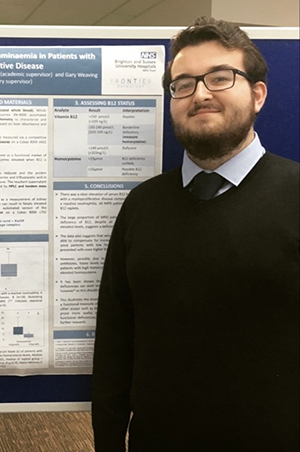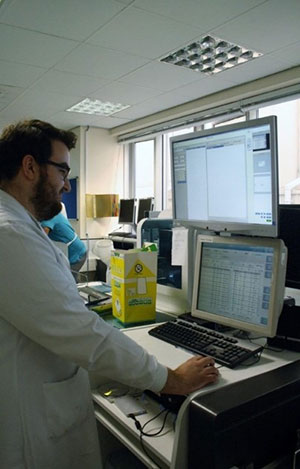Meet Joshua

How Joshua started out
"I undertook an IBMS Accredited BSc in Biomedical Sciences at the University of Brighton. During this time, I was successful in securing a year-long placement in the Biochemistry Department at Brighton and Sussex University Hospitals as a trainee Biomedical Scientist. Here I completed my IBMS Registration Portfolio.
I have since completed my IBMS specialist portfolio in clinical biochemistry in 2019 and am currently undertaking my MSc in Biomedical Science at Ulster University via distance learning. In just five years, I am where I am today."
What is clinical biochemistry?
"Clinical biochemistry is the study of chemicals and proteins in the blood and other body fluids to aid in the diagnosis, monitoring and prognosis of disease.
As a biomedical scientist specialising in biochemistry, I apply many different analytical techniques to achieve this.
This could include measuring markers of heart damage to diagnosing a heart attack and hormone levels for thyroid disease on large automated analysers, or performing electrophoresis to diagnose multiple myeloma to identifying poisons and drugs in overdoses."
What does a typical day in your department look like?
8 - 9am
"I arrive bright and early to take a handover from the night shift. They let me know of any outstanding work (there always is of course, the lab never stops!), critical results to phone and the status of the analysers.
Unfortunately, the night Biomedical Scientist reports an analyser probe crashed and bent just before I walked in, so straight away I’m rolling my sleeves up taking apart and fixing a complicated analyser."
9am
"The rest of the day shift arrive, a team of Medical Laboratory Assistants and Biomedical Scientists.
I lead the morning huddle in the automation lab, delegating responsibilities for the work such as processing urgent samples and sample preparation by the Medical Laboratory Assistants team, and who is responsible for validating results and overseeing the analysers by the Biomedical Scientists.
Any messages from the night are relayed to everyone as well as any important things to note such as engineer visits."
10am
"As a senior Biomedical Scientist my main job is overseeing the section, ensuring workflow and quality is maintained and providing specialist input for the Biomedical Scientists if they get any particularly tricky results to deal with.
On top of this, I could be dealing with analyser breakdowns, liaising with engineers, updating lab protocols and so much more."
12 - 2pm
"As a training officer, I also have responsibility of our registration and specialist trainees. Today I go over a piece of evidence someone has made for their portfolio and give them a tutorial on the importance of quality control."
2pm
"Finally, lunchtime! A quick bite to eat and a coffee."
3 - 5pm

"The rest of the afternoon is spent doing admin.
I check stock levels of reagents to ensure we aren’t running out of anything key, report external quality assurance results that allow us to check how well we are performing, and catch up on emails that have been building throughout the day."
5 - 8pm
"It’s not all paperwork though!
The day team have gone home and so I am back on the bench to continue processing just some of the nearly 3,000 samples we received today.
The priority is work from Accident & Emergency (A&E), Intensive Care Unit and other acute wards, however there is always a large amount of GP work to get through as well. Due to these sheer numbers, a lot of the work is automated.
In just a few hours I have already seen a cardiac arrest and paracetamol overdose and contacted the out of hours GP to inform them of a patient that’s developed acute kidney injury in the community. Seeing them admitted into A&E later is a humbling reminder of the direct role we play in patient care."
What do you most enjoy about the role?
"I really enjoy the variable work of a Biomedical Scientist – you never know what a day may bring.
As a senior Biomedical Scientist there is a nice balance of analytical bench work, hands on analyser maintenance and troubleshooting so I am not stuck doing paperwork all day.
I particularly enjoy training as I know what it was like to be a trainee not long ago and how important it is to have a motivated training officer. It also provides good motivation to keep myself up to date with the newest advances in biomedical science and, even though I am primarily in automation, means that I have to keep my skills up in special chemistry too."
What are your future plans?
"Once I have completed my MSc, I am hoping to continue my personal development at work.
The IBMS have many opportunities for this so the next step may be a Certificate of Expert Practice in Training to supplement my role. Beyond this, the profession is constantly evolving with the development of consultant Biomedical Scientist roles and clinical scientist equivalency becoming more common. So, who knows what could happen in the next 5 years."
